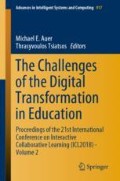Abstract
Teaching and learning processes can benefit from the use of online resources, enabling the improvement of teachers and students productivity and giving them flexibility and support for collaborative work. Particularly in engineering courses, open source tools, such as Jupyter Notebook, provide a programming environment for developing and sharing educational materials, combining different types of resources such as text, images and code in several programming languages in a single document, accessible through a web browser. This environment is also suitable to provide access to online experiments and explaining how to use them. This article presents some examples of online resources supported by Jupyter Notebook, in subjects of an Informatics Engineering course, seeking to contribute to the development of innovative teaching methodologies.
Access this chapter
Tax calculation will be finalised at checkout
Purchases are for personal use only
Notes
- 1.
http://jupyter.org/ (last accessed: July 20, 2018).
- 2.
https://github.com/albjlcardoso/python_examples/blob/master/Udometer_online_v2.ipynb (last accessed: July 20, 2018).
References
Garrison, D.R., Vaughan, N.D.: Blended Learning in Higher Education: Framework, Principles, and Guidelines. Wiley (2008)
Pérez, F., Granger, B.E.: IPython: a system for interactive scientific computing. Comput. Sci. Eng. 9(3), 21–29 (2007)
Kluyver, T., Ragan-Kelley, B., Pérez, F., Granger, B., Bussonnier, M., Frederic, J., Kelley, K., Hamrick, J., Grout, J., Corlay, S., Ivanov, P., Avila, D., Abdalla, S., Willing, C.: Jupyter development team: Jupyter notebooks—a publishing format for reproducible computational workflows. In: ebook “Positioning and Power in Academic Publishing: Players, Agents and Agendas”, pp. 87–90 (2016)
Iverson, K.E.: A Programming Language, New York, NY. Wiley, USA (1962)
Spence, R.: APL Demonstration, Imperial College London (1975). Available from: https://www.youtube.com/watch?v=_DTpQ4Kk2wA. Last Accessed 20 July 2018
Cardoso, A., Leitão, J., Gil, P., Marques, S.M., Simões, N.E.: Using IPython to demonstrate the usage of remote labs in engineering courses—a case study using a remote rain gauge. In: Proceedings of the 15th International Conference on Remote Engineering and Virtual Instrumentation (REV2018), pp. 683–689 (2018)
Raju, A.B.: IPython notebook for teaching and learning. In: Natarajan R. (eds) Proceedings of the International Conference on Transformations in Engineering Education. Springer, New Delhi (2015)
Hamrick, J.B.: Creating and grading IPython/Jupyter notebook assignments with NbGrader. In: Proceedings of the 47th ACM Technical Symposium on Computing Science Education—SIGCSE’16, pp. 242–242 (2016)
Unpingco, J.: Python for Signal Processing. Springer (2014). Available from: https://github.com/unpingco/Python-for-Signal-Processing. Last Accessed 20 July 2018
Johansson, R.: QuTiP Lectures as IPython Notebooks. Available from: https://github.com/jrjohansson/qutip-lectures. Last Accessed 20 July 2018
Dhar, V.: Data science and prediction. Commun. ACM 56(12), 64 (2013)
Leek, J.: The key word in “data science” is not data, it is science. Simply Stat. (2013)
Acknowledgements
This work has been partially supported by the Portuguese Foundation for Science and Technology (FCT) under the project UID/EEA/00066/2013 and the Ph.D. grant SFRH/BD/122103/2016.
Author information
Authors and Affiliations
Corresponding author
Editor information
Editors and Affiliations
Rights and permissions
Copyright information
© 2019 Springer Nature Switzerland AG
About this paper
Cite this paper
Cardoso, A., Leitão, J., Teixeira, C. (2019). Using the Jupyter Notebook as a Tool to Support the Teaching and Learning Processes in Engineering Courses. In: Auer, M., Tsiatsos, T. (eds) The Challenges of the Digital Transformation in Education. ICL 2018. Advances in Intelligent Systems and Computing, vol 917. Springer, Cham. https://doi.org/10.1007/978-3-030-11935-5_22
Download citation
DOI: https://doi.org/10.1007/978-3-030-11935-5_22
Published:
Publisher Name: Springer, Cham
Print ISBN: 978-3-030-11934-8
Online ISBN: 978-3-030-11935-5
eBook Packages: Intelligent Technologies and RoboticsIntelligent Technologies and Robotics (R0)

